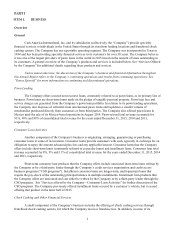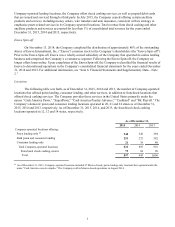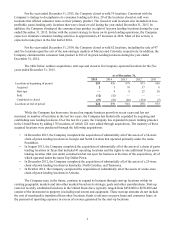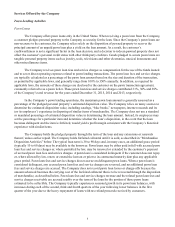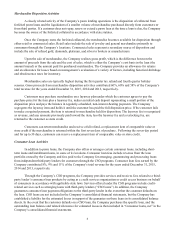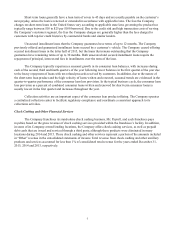Cash America 2015 Annual Report Download - page 16
Download and view the complete annual report
Please find page 16 of the 2015 Cash America annual report below. You can navigate through the pages in the report by either clicking on the pages listed below, or by using the keyword search tool below to find specific information within the annual report.
Company’s products must also comply with the advertising requirements set forth in the Truth in Lending Act. Also,
any of the Company’s telephone marketing activities must comply with the Telephone Consumer Protection Act and
the Telephone Sales Rule. The Telephone Consumer Protection Act prohibits the use of automatic telephone dialing
systems for communications with wireless phone numbers without the express consent of the consumer, and the
Telephone Sales Rule established the Do Not Call Registry and sets forth standards of conduct for all telemarketing.
The Company’s advertising and marketing activities are also subject to the CAN-SPAM Act of 2003 which
establishes certain requirements for commercial email messages and specifies penalties for the transmission of
commercial email messages that are intended to deceive the recipient as to the source of content.
Protection of Military Members and Dependents. In July 2015, the Department of Defense published a
finalized set of new rules under the Military Lending Act. The Military Lending Act (and rules previously adopted
thereunder) has previously restricted the Company from offering its short-term unsecured credit products to
members of the military or their dependents because none of the Company’s short-term unsecured credit products
carry a military annual percentage rate of 36% or less. The new rule expands the scope of the credit products
covered by the Military Lending Act to include certain non-purchase money loans secured by personal property or
vehicles and certain unsecured installment loan products to the extent any of such products have a military annual
percentage rate greater than 36%. Because none of the Company’s pawn loans or secured or unsecured installment
loans have a military annual percentage rate of 36% or less, once the new rule takes effect, the Company may not
be able to offer any of its current credit products (including pawn loans) to members of the military or their
dependents. The rules under the Military Lending Act contain various disclosure requirements, limitations on
renewals and refinancing and other restrictions, including restrictions on the use of prepayment penalties, arbitration
provisions and certain waivers of rights. The rule provides that a lender is subject to fines and other penalties if it
extends credit to a member of the military or a military dependent on terms prohibited by the rule. The new rule
does provide a safe harbor for a lender if it verifies a potential borrower’s military status before extending credit by
checking the Department of Defense’s database or a database of a national credit reporting agency that provides
military status information. As to the Company’s pawn loan and longer-term credit products, compliance with the
new rule is required by October 3, 2016. Compliance with the new rule and coordinating with a safe harbor
database could be complex and increase compliance costs. The new military lending rules are not expected to have
a material adverse effect on the Company’s business, prospects, results of operations or cash flows, but the
Company is still assessing their potential impact. In addition, Federal law also limits the annual percentage rate on
existing loans when the consumer becomes an active-duty member of the military during the life of a loan, or the
spouse of an active duty member of the military during the life of the loan. Pursuant to federal law, the interest rate
mustbereducedto6%peryearonamountsoutstandingduringthetimeinwhichtheservicememberisonactive
duty.
Funds Transfer and Signature Authentication Laws. The Company’s business is also subject to the federal
Electronic Funds Transfer Act and various other laws, rules and guidelines relating to the procedures and
disclosures required for debiting or crediting a debtor’s bank account relating to a consumer loan (i.e., ACH funds
transfer). Furthermore, the Company is also subject to various state and federal e-signature rules mandating that
certain disclosures be made and certain steps be followed in order to obtain and authenticate e-signatures.
Debt Collection Practices. Additionally, the Company’s CSO programs are required by both federal and
some state laws to comply with the federal Fair Debt Collection Practices Act. The Company also uses the Fair
Debt Collection Practices Act as a guide in connection with operating its other collection activities. The Company is
also required to comply with all applicable state collection practices laws.
Privacy and Security of Non-Public Customer Information. The Company is also subject to various federal
and state laws and regulations relating to privacy and data security. Under these laws, including the federal Gramm-
Leach-Bliley Act, the Company must disclose to consumers its privacy policy and practices, including those
policies relating to the sharing of consumers’ nonpublic personal information with third parties. This disclosure
must be made to consumers when the customer relationship is established and, in some cases, at least annually
thereafter. These regulations also require the Company to ensure that its systems are designed to protect the
12


